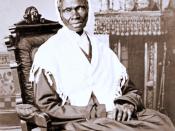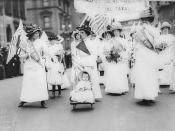"Then the Lord God said, 'It is not good that the man should be alone; I will make him a helper fit for him'"(The Holy Bible, Genesis 2:18). Ever since the beginning of time women have been looked down upon as "helpers," created specifically for the convenience of men.
Feminism first emerged as a plea for equality in America in the late nineteenth and early twentieth century. Feminists succeeded in their struggle to gain equal voting rights, but just because women were allowed the same voting rights as men absolutely did not guarantee complete equality. Women were still considered to be daughters who grow into mothers, and their only real job was in the home as a wife and mother. Educating women was still seen as an unnecessary waste of money and time (Paludi 333).
Once World War Two began, women were needed to take over the jobs of their husbands, fathers, and sons.
Women were given factory jobs, and paid (although not as much) to support their families like men had. This is when women began feeling their former life was lacking, but when the men came back from war, they were fired and put back in their "rightful" place (Hewlett 57). By then, the seeds of rebellion were already planted. The feminist movement was dormant for a while, but when it reemerged in the 1960s it was greater and stronger than ever. Women were fed up with the "quiet repression" (Jackson ) in their everyday lives, and finally took a stand against the double standards they were subjected to.
The feminist message started spreading rapidly with a large number of new Women's studies courses in colleges all over the country. Famous feminist and author Gloria Steinem said:
Feminism has evolved from the twenties, we now know to never...


